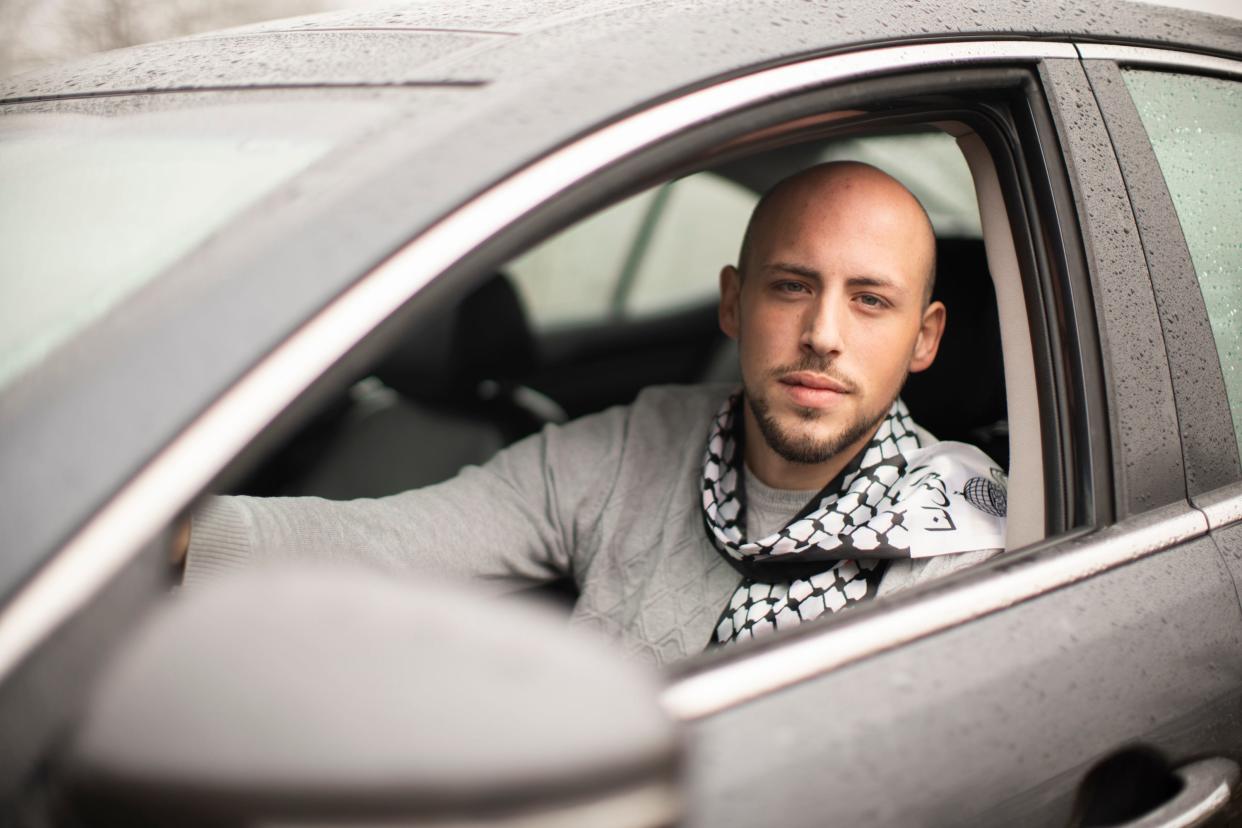He says he was the victim of Islamophobia. Lyft 'fired' him for alleged antisemitism

A Muslim advocacy organization is calling on Lyft to reinstate a Palestinian American driver in Columbus who was kicked off the platform in December after what the company alleges was antisemitic behavior.
The driver has denied the accusations and said he was the victim of Islamophobic harassment by riders.
A Lyft spokesperson said the driver, Salam Zaghmot, was deactivated based on safety reports that both he and his riders filed after two recent incidents.
Lyft refused to provide details of what Zaghmot allegedly said, citing “confidentiality of its riders and drivers.” A spokesperson said the company had no audio or video evidence of either incident.
“Lyft unequivocally condemns antisemitism and all other forms of discrimination on the basis of religion or country of origin. … We encourage riders and drivers to report harassment or discrimination in the Lyft app,” said the spokesperson.
According to Zaghmot, both of the incidents involved groups of passengers who had been drinking alcohol who picked arguments with him about the ongoing Israel-Hamas war. He said they made racist and discriminatory comments about his name and place of origin.
The Dispatch was unable to speak with the riders, whom Lyft did not identify.
Zaghmot said riders often identify that he's Muslim based on his first name.
“Salam means peace,” Zaghmot told The Dispatch.
“I have no problem with (Jewish people) or the religion,” he said, adding that he opposes Israel’s casualty-heavy military campaign in Gaza. "I do have a problem with people using their religion to kill … and justify it. We as Muslims are suffering through people using our religion in harmful ways — so I would not wish that upon the Jews or the Christians because it does (have) an impact on the true believers, who truly want to live in peace.”
The Ohio chapter of the Council on American Islamic Relations has called on Lyft to reactivate Zaghmot’s driving account.
“It is deeply troubling that Lyft did not thoroughly investigate the circumstances surrounding the incident before taking punitive action against Mr. Zaghmot,” CAIR-Ohio Legal Director Lina Abbaoui said in a prepared statement.
As independent contractors, rideshare drivers have few options for appeal, advocates say
Advocacy organizations have reported spikes in hate speech, hate crimes and discrimination against both Jews and Muslims in the U.S. since the Israel-Hamas war began.
The Anti-Defamation League reported 3,291 antisemitic incidents between Oct. 7 and early January, or around 36 per day, a 361% increase compared to the same period one year prior.
Similarly, CAIR reported 2,171 complaints of anti-Muslim and anti-Palestinian bias nationally between Oct. 7 and early December, or roughly 38 per day, up 172% from the same period the year before.
Locally reported incidents have included a motorist who allegedly swerved to hit pedestrians at a pro-Palestinian rally at the Ohio Statehouse on Oct. 12; two people who shouted slogans and vandalized Israeli flags at Ohio State University’s Hillel building on Nov. 9; and a physical assault against two Jewish OSU students by assailants who reportedly shouted racist slurs on Nov. 10.
Ridesharing — in which complete strangers share a confined space for a few minutes or even a few hours — can sometimes lead to tense situations, according to drivers.
Tyler Sandness, director of operations for Rideshare Drivers United, a California-based workers’ advocacy organization, said that when riders accuse drivers of harassment, Uber and Lyft usually side with the riders.
“It's much easier to get rid of somebody who's a potential problem-child than it is to actually get at the heart of the matter. To do an investigation … is expensive,” Sandness said.
Sandness said that drivers who have been deactivated — essentially fired — have few options to appeal because they are classified as independent contractors rather than employees.
A recent rideshare drivers’ protest in New York City took aim at what drivers see as unfair deactivations.
“Deactivation policies are very obtuse — there isn't a clear, transparent system,” Sandness said.

Driver said riders were verbally abusive
Zaghmot told The Dispatch that he works in restaurants and drove for Lyft in his spare time for around six years. The Colorado-born Palestinian American shared account screenshots showing a five-star rating and over 1,800 rides before deactivation.
According to Zaghmot, the first incident occurred after he picked up two “highly intoxicated” riders in Dublin in November. Zaghmot said one passenger remarked that one of his friends thought Gaza should be turned into a "parking lot.”
“He kept poking me. 'What do you think, man? What do you think?'” Zaghmot recounted.
Zaghmot said he tried to avoid the conversation and offered to end the ride immediately. The riders declined, he said, and they argued until reaching the destination. Lyft notified him shortly afterwards that a rider filed a complaint and temporarily deactivated his account, he said. But Zaghmot was able to speak to a Lyft representative, share his side of the story and get his account reactivated.
Zaghmot said the second incident occurred in the early morning hours of Dec. 2, when he picked up four women who had been bar-hopping in Columbus’ Short North neighborhood.
He said the passenger who booked the ride made friendly small talk, but another passenger in the back seat kept asking about his name’s origin, remarking that it sounded foreign.
“I was like, ‘I’m from Denver, Colorado.’ I didn't even mention Palestine. I just wanted to finish my job, make sure to drop them off safe,” Zaghmot said.
According to Zaghmot, the backseat passenger kept asking about his origins, then asked if he was a terrorist.
“I pulled up … on High Street, I told her, ‘Get the f--- out of my car,’” Zaghmot recounted.
After the passengers exited, Zaghmot said he immediately called Lyft’s trust and safety team to report the incident.
“I can only imagine how you must have felt during this ride, in which this rider made discriminatory questions about your name. … This is behavior we do not tolerate,” wrote a Lyft representative in an email follow-up several minutes later, which Zaghmot shared with The Dispatch.
Zaghmot said that four days later, a Lyft representative called and informed him that the riders had made a complaint against him. His account was deactivated minutes later, he said.
A Lyft spokesperson said the company took “appropriate actions” regarding the riders whom Zaghmot accused of harassment but declined to say whether the riders are still allowed to use the app.
Amina Barhumi, CAIR-Ohio’s executive director, said she has not heard about other recent driver-deactivation cases similar to Zaghmot’s.
Sandness said that unlike Zaghmot, many Lyft drivers get deactivated without even getting to speak to a Lyft representative. Deactivated drivers’ best chance at reinstatement is by producing video footage supporting their version of events, he said.
Zaghmot said he has no video of the incidents in question, and regrets not buying a dash cam.
Since he did the job as a side gig, “I never saw the need until now,” he said.
Peter Gill covers immigration, New American communities and religion for the Dispatch in partnership with Report for America. You can support work like his with a tax-deductible donation to Report for America at:bit.ly/3fNsGaZ.
pgill@dispatch.com
This article originally appeared on The Columbus Dispatch: Deactivated Lyft driver says he was victim of Islamophobia

